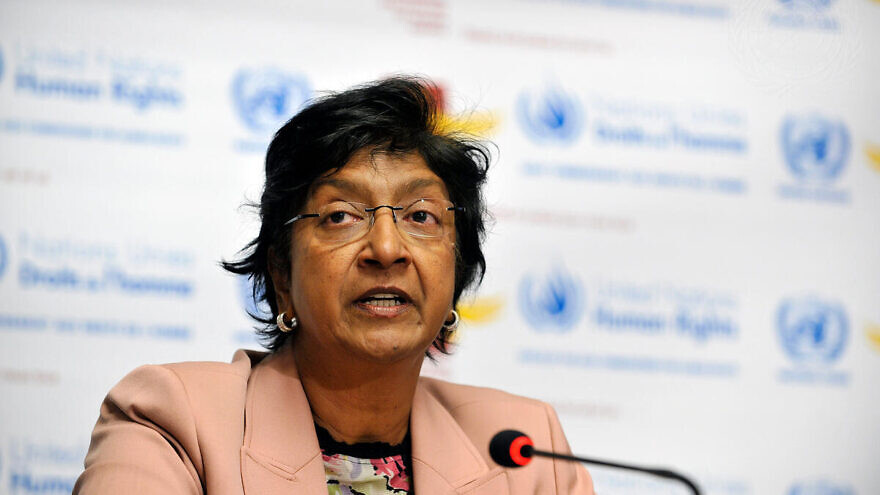by Mike Wagenheim
The Human Rights Council’s inquiry on the Israeli-Palestinian conflict “is further demonstration of long-standing, disproportionate attention given to Israel.”
 |
Navi Pillay, chair of the United Nations Commission
of Inquiry on the Occupied Palestinian Territory, including East
Jerusalem, and Israel, addresses a press conference. Photo by Jean-Marc
Ferré/U.N. Photo. |
The United States issued a joint statement Tuesday on behalf of 27 countries, saying they are “deeply concerned” about a United Nations commission accused of bias against Israel and populated with members with histories of antisemitism.
The U.N. Commission of Inquiry investigating the Israeli-Palestinian conflict is delivering its latest report to the U.N. Human Rights Council today in Geneva.
The Human Rights Council created the three-person commission in 2021 following an 11-day conflict (“Operation Guardian of the Walls”) between Israel and terrorist groups in Gaza. The commission was given a unique open-ended mandate: It is charged with investigating any Israeli human rights violations both inside and outside the country’s sovereign territory.
Michèle Taylor, U.S. ambassador to the U.N. in Geneva, said in the joint statement that the commission’s mandate, “with no sunset clause, end date, or clear limitations connected to the escalation in May 2021,” led to many of the council’s members expressing “fundamental concerns” when the resolution creating the commission came up for adoption.
“To be clear, no one is above scrutiny and it is this council’s responsibility to promote and protect human rights the world over. We must work to counter impunity and promote accountability on a basis of consistent and universally applied standards,” the statement reads. “We believe the nature of this COI [commission of inquiry] is further demonstration of long-standing, disproportionate attention given to Israel in the council, and must stop.”
The signatories to the joint statement include a diverse geographical group. Albania, Austria, Bulgaria, Cameroon, Canada, Croatia, Czechia, Eswatini, Fiji, Guatemala, Hungary, Israel, Italy, Kenya, Liberia, Marshall Islands, Micronesia, Nauru, North Macedonia, Palau, Papua New Guinea, Poland, Romania, Slovakia, Togo and the United Kingdom joined Washington in signing on.
That is five more countries than signed on to a previous statement critical of the commission of inquiry and its members.
Disproportionate scrutiny
“We continue to believe that this long-standing disproportionate scrutiny should end, and that the council should address all human rights concerns, regardless of country, in an even-handed manner. Regrettably, we are concerned that the Commission of Inquiry will further contribute to the polarization of a situation about which so many of us are concerned,” Tuesday’s statement concluded.
Israeli Foreign Minister Eli Cohen issued a statement on Tuesday calling the commission’s latest report “one-sided and false.”
Cohen added that the commission of inquiry “is a stain on the U.N. and on the Human Rights Council. Its commissioners were selected for their anti-Israeli positions and continue in their roles despite antisemitic statements.”
The Human Rights Council is holding an “open dialogue” on the commission’s work on Tuesday, with several member states set to speak.
Back in October, Israel received a broad swath of support when several states condemned the commission as it delivered another report.
In an interview with an anti-Israel website last summer, commission member Miloon Kothari alleged that social media was controlled by the “Jewish lobby.” He would later issue an apology for that remark, along with a comment in the same interview questioning whether Israel should be allowed to hold U.N. membership.
“We cannot ignore the fact that a current member of the commission made antisemitic comments in late August, referring disparagingly to the ‘Jewish lobby,’” U.S. envoy to the U.N. General Assembly Lisa Carty told the General Assembly’s Third Committee in October.
“We categorically reject this statement, which we deem to be outrageous, inappropriate and corrosive,” Carty said. “We regret that senior U.N. leadership has still not publicly repudiated these repugnant statements or asked this commission member to step down.”
Albania, Australia, Austria, Bulgaria, Canada, Czechia, Germany, Guatemala, Italy, Liberia, the Marshall Islands, Micronesia, the Netherlands, the United Kingdom and Uruguay were among the countries defending Israel’s position, along with the European Union, which issued a statement against the commission of inquiry. It was a rare showing of strong support from a wide range of countries at the U.N., including notably from Australia, whose government last year rescinded its recognition of west Jerusalem as Israel’s capital.
The other two members of the commission are well known for their anti-Israel stances, and chair Navi Pillay has been a vocal supporter of the BDS movement. She refused to condemn Kothari’s remark, and continued to defend it even as he apologized for it.
All of the commission’s work has been highly critical of Israel, and has barely mentioned war crimes or other human rights violations committed by terrorist elements in the Gaza Strip or by the Palestinian Authority.
Mike Wagenheim
Source: https://www.jns.org/world-news/anti-israel/23/6/20/296643/
No comments:
Post a Comment